China’s parliament yesterday said that it would tightly control the nomination of candidates for a landmark election in Hong Kong in 2017, a move likely to trigger mass protests in the territory’s Central business district by disappointed democracy activists.
China’s Standing Committee of the National People’s Congress (NPC) said that it had endorsed a framework to let just two or three candidates run in a 2017 vote for Hong Kong’s next leader. All candidates must first obtain majority backing from a nominating committee likely to be stacked with Beijing loyalists.
The relatively tough decision by the NPC — China’s final arbiter on the territory’s democratic affairs — makes it almost impossible for opposition democrats to get on the ballot.
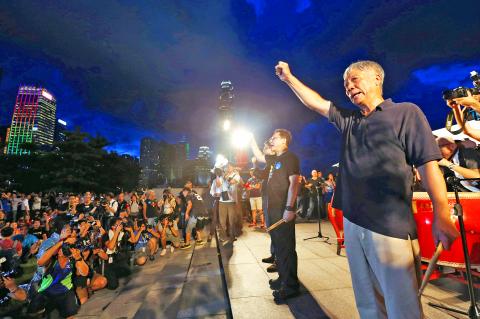
Photo: Reuters
“This is a legal, fair and reasonable decision. It is a dignified, prudent decision and its legal effect is beyond doubt,” Li Fei (李飛), the deputy secretary-general of the NPC Standing Committee, told reporters after the decision.
Hundreds of “Occupy Central” activists, who demand Beijing allow a real, free election, will this evening hold a small protest to formally launch their campaign of civil disobedience, that is to climax with a blockade the city’s business district.
Political reform has been a constant source of friction between Hong Kong’s pro-democracy movement and the mainland since the former British colony was handed back to Chinese Communist Party rulers in 1997.
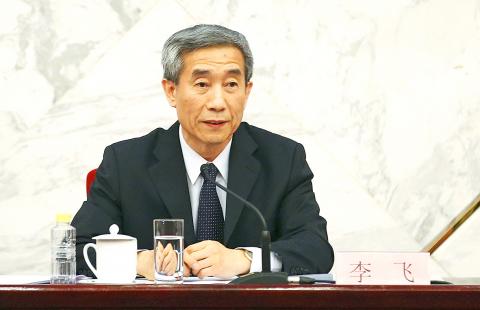
Photo: Reuters
The activists in Hong Kong stressed that they would not paralyze the Central district immediately, but would this evening lay out plans for smaller actions in the coming weeks leading up to a full-scale protest in the main business district.
Scores of police vehicles and hundreds of officers were deployed outside Hong Kong Government headquarters as people began to gather, some chanting slogans.
Key government buildings, including the chief executive’s office and a People’s Liberation Army barracks nearby, were also ringed by high fences and barricades.
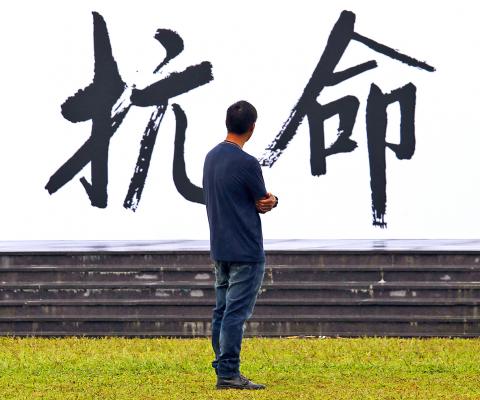
Photo: Reuters
“It [the NPC decision] leaves no room for us to fight for a genuinely democratic system and we will begin our campaign for peaceful, nonviolent struggle,” said Joseph Cheng (鄭宇碩), the convener of the Alliance for True Democracy, a coalition of groups advocating universal suffrage in Hong Kong.
“We want to tell the world we haven’t given up. We will continue to fight,” he said.
On the surface, the congress’ decision is a breakthrough that endorses the framework for the first direct vote by a Chinese territory to choose its leader.
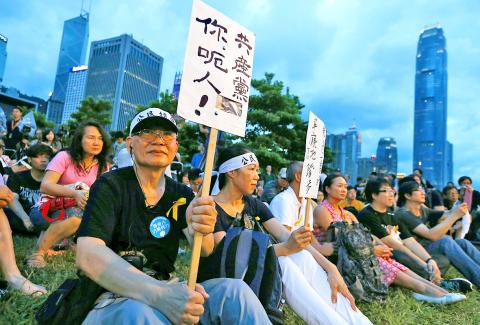
Photo: Reuters
Beijing is already hailing it as a milestone in democratic reform.
However, by tightly curbing nominations for the 2017 leadership poll, some democrats said Beijing was pushing a Chinese-style version of “fake” democracy.
The NPC statement said all nominations would be carried out according to “democratic procedures” and each candidate would need “the endorsement of more than half” of a nominating committee that will be similar in composition to an existing 1,200-person election committee stacked with Beijing loyalists.
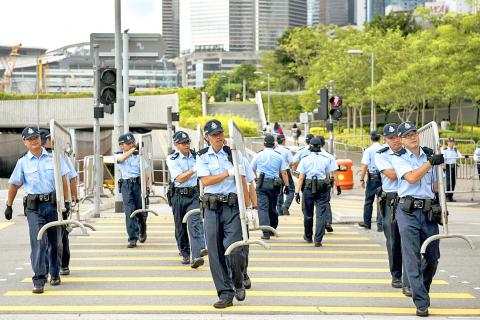
Photo: AFP
The proposed electoral framework will still have to be endorsed by two-thirds of Hong Kong’s 70-seat legislature.
With pro-democracy lawmakers holding more than a third of the seats, it will likely be shelved.
Senior Chinese officials have repeatedly warned activists against their “illegal” protests and say they will not back down.
Some key members of the pro-democracy movement, including media magnate Jimmy Lai (黎智英), have also come under pressure in the run-up to the Chinese parliamentary decision.
On Friday, China also repeated its warning against foreign interference, saying it will not tolerate the use of Hong Kong “as a bridgehead to subvert and infiltrate the mainland.”
The Occupy Central movement has not yet won broad support among Hong Kong’s middle class, who are concerned about antagonizing China and disruptions to business, but strong measures by China or the Hong Kong police could change that.

AGING: As of last month, people aged 65 or older accounted for 20.06 percent of the total population and the number of couples who got married fell by 18,685 from 2024 Taiwan has surpassed South Korea as the country least willing to have children, with an annual crude birthrate of 4.62 per 1,000 people, Ministry of the Interior data showed yesterday. The nation was previously ranked the second-lowest country in terms of total fertility rate, or the average number of children a woman has in her lifetime. However, South Korea’s fertility rate began to recover from 2023, with total fertility rate rising from 0.72 and estimated to reach 0.82 to 0.85 by last year, and the crude birthrate projected at 6.7 per 1,000 people. Japan’s crude birthrate was projected to fall below six,

Conflict with Taiwan could leave China with “massive economic disruption, catastrophic military losses, significant social unrest, and devastating sanctions,” a US think tank said in a report released on Monday. The German Marshall Fund released a report titled If China Attacks Taiwan: The Consequences for China of “Minor Conflict” and “Major War” Scenarios. The report details the “massive” economic, military, social and international costs to China in the event of a minor conflict or major war with Taiwan, estimating that the Chinese People’s Liberation Army (PLA) could sustain losses of more than half of its active-duty ground forces, including 100,000 troops. Understanding Chinese

US President Donald Trump in an interview with the New York Times published on Thursday said that “it’s up to” Chinese President Xi Jinping (習近平) what China does on Taiwan, but that he would be “very unhappy” with a change in the “status quo.” “He [Xi] considers it to be a part of China, and that’s up to him what he’s going to be doing, but I’ve expressed to him that I would be very unhappy if he did that, and I don’t think he’ll do that. I hope he doesn’t do that,” Trump said. Trump made the comments in the context

SELF-DEFENSE: Tokyo has accelerated its spending goal and its defense minister said the nation needs to discuss whether it should develop nuclear-powered submarines China is ramping up objections to what it sees as Japan’s desire to acquire nuclear weapons, despite Tokyo’s longstanding renunciation of such arms, deepening another fissure in the two neighbors’ increasingly tense ties. In what appears to be a concerted effort, China’s foreign and defense ministries issued statements on Thursday condemning alleged remilitarism efforts by Tokyo. The remarks came as two of the country’s top think tanks jointly issued a 29-page report framing actions by “right-wing forces” in Japan as posing a “serious threat” to world peace. While that report did not define “right-wing forces,” the Chinese Ministry of Foreign Affairs was